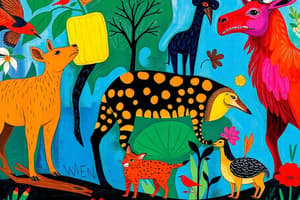Podcast
Questions and Answers
What is the basic unit of life?
What is the basic unit of life?
- Atom
- Molecule
- Organ
- Cell (correct)
Prokaryotes are organisms with a nucleus.
Prokaryotes are organisms with a nucleus.
False (B)
What defines a species?
What defines a species?
A unique type of organism.
What do producers do?
What do producers do?
Which statement is true regarding eukaryotes?
Which statement is true regarding eukaryotes?
The smallest unit of matter is an ______.
The smallest unit of matter is an ______.
The biosphere includes only land regions.
The biosphere includes only land regions.
What is the primary role of fungi in ecosystems?
What is the primary role of fungi in ecosystems?
What is the scientific method?
What is the scientific method?
DNA is the hereditary material that influences ______.
DNA is the hereditary material that influences ______.
What does the term biodiversity refer to?
What does the term biodiversity refer to?
Match the following terms with their definitions:
Match the following terms with their definitions:
Flashcards are hidden until you start studying
Study Notes
Key Concepts in Biology
- Biology is the scientific study of life, encompassing various organisms and their interactions.
- Atoms are the smallest unit of matter, forming molecules through bonding.
Prokaryotes and Eukaryotes
- Prokaryotes include bacteria and archaea, characterized by the absence of a nucleus in their cells.
- Bacteria and archaea are the largest and most recognized groups among prokaryotes.
- Eukaryotes possess a nucleus and include organisms such as protists, fungi, plants, and animals.
Classification of Organisms
- Species refer to unique types of organisms, and populations are groups of interbreeding individuals of the same species in a defined area.
- Taxonomy is the classification system for organizing species based on shared characteristics.
Ecosystems and Biosphere
- The biosphere includes all regions of Earth that support life, consisting of various ecosystems.
- Ecosystems are communities of organisms interacting with their environment.
Cells and Tissues
- Cells are the smallest units of life, categorized into prokaryotic (without a nucleus) and eukaryotic (with a nucleus).
- Tissues are specialized cells organized to perform collective functions in multicellular organisms.
- Organs comprise groups of tissues working together for a specific task.
Scientific Method and Theory
- The scientific method involves systematic steps: observation, hypothesis formation, prediction, experimentation, data analysis, and conclusion.
- A scientific theory is a well-tested hypothesis that can make accurate predictions, whereas pseudoscience presents claims without adherence to scientific principles.
- Laws of nature describe consistent phenomena without complete explanations.
Characteristics of Living Organisms
- Life is defined by the capacity to reproduce, grow, and respond to stimuli.
- Biodiversity represents the variety of life on Earth and the importance of nutrients and energy for survival.
- Producers, such as plants, create their own food, while consumers obtain energy from other organisms.
Homeostasis
- Homeostasis refers to the maintenance of a stable internal environment in living organisms, essential for proper functioning and survival.
Studying That Suits You
Use AI to generate personalized quizzes and flashcards to suit your learning preferences.




